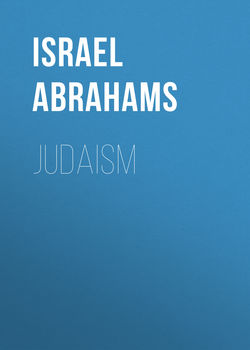Judaism

Реклама. ООО «ЛитРес», ИНН: 7719571260.
Оглавление
Israel Abrahams. Judaism
FOREWORD
CHAPTER I
CHAPTER II
CHAPTER III
CHAPTER IV
CHAPTER V
CHAPTER VI
CHAPTER VII
CHAPTER VIII
SELECTED LIST OF BOOKS ON JUDAISM
Отрывок из книги
The aim of this little book is to present in brief outline some of the leading conceptions of the religion familiar since the Christian Era under the name Judaism.
The word 'Judaism' occurs for the first time at about 100 B.C., in the Graeco-Jewish literature. In the second book of the Maccabees (ii. 21, viii. 1), 'Judaism' signifies the religion of the Jews as contrasted with Hellenism, the religion of the Greeks. In the New Testament (Gal. i. 13) the same word seems to denote the Pharisaic system as an antithesis to the Gentile Christianity. In Hebrew the corresponding noun never occurs in the Bible, and it is rare even in the Rabbinic books. When it does meet us, Jahaduth implies the monotheism of the Jews as opposed to the polytheism of the heathen.
.....
But this much must be premised. If the Religion of Israel passed through the stages of totemism, animism, and polydemonism; if it was indebted to Canaanite, Kenite, Babylonian, Persian, Greek, and other foreign influences; if it experienced a stage of monolatry or henotheism (in which Israel recognised one God, but did not think of that God as the only God of all men) before ethical monotheism of the universalistic type was reached; if, further, all these stages and the moral and religious ideas connected with each left a more or less clear mark in the sacred literature of Israel; then the legacy which Judaism received from its past was a syncretism of the whole of the religious experiences of Israel as interpreted in the light of Israel's latest, highest, most approved standards. Like the Bourbon, the Jew forgets nothing; but unlike the Bourbon, the Jew is always learning. The domestic stories of the Patriarchs were not rejected as unprofitable when Israel became deeply impregnated with the monogamous teachings of writers like the author of the last chapter of Proverbs; the character of David was idealised by the spiritual associations of the Psalter, parts of which tradition ascribed to him; the earthly life was etherialised and much of the sacred literature reinterpreted in the light of an added belief in immortality; God, in the early literature a tribal non-moral deity, was in the later literature a righteous ruler who with Amos and Hosea loved and demanded righteousness in man. Judaism took over as one indivisible body of sacred teachings both the early and the later literature in which these varying conceptions of God were enshrined; the Law was accepted as the guiding rule of life, the ritual of ceremony and sacrifice was treasured as a holy memory, and as a memory not contradictory of the prophetic exaltation of inward religion but as consistent with that exaltation, as interpreting it, as but another aspect of Micah's enunciation of the demands of God: 'What doth the Lord require of thee but to do justly, to love mercy, and to walk humbly with thy God?'
Judaism, in short, included for the Jew all that had gone before. But for St. Paul's attitude of hostility to the Law, but for the deep-seated conviction that the Pauline Christianity was a denial of the Jewish monotheism, the Jew might have accepted much of the teaching of Jesus as an integral part of Judaism. In the realm of ideas which he conceived as belonging to his tradition the Jew was not logical; he did not pick and choose; he absorbed the whole. In the Jewish theology of all ages we find the most obvious contradictions. There was no attempt at reconciliation of such contradictions; they were juxtaposed in a mechanical mixture, there was no chemical compound. The Jew was always a man of moods, and his religion responded to those varying phases of feeling and belief and action. Hence such varying judgments have been formed of him and his religion. If, after the mediaeval philosophy had attempted to systematise Judaism, the religion remained unsystematic, it is easy to understand that in the earlier centuries of the Christian Era contradictions between past and present, between different strata of religious thought, caused no trouble to the Jew so long as those contradictions could be fitted into his general scheme of life. Though he was the product of development, development was an idea foreign to his conception of the ways of God with man. And to this extent he was right. For though men's ideas of God change, God Himself is changeless. The Jew transferred the changelessness of God to men's changing ideas about him. With childlike naivete he accepted all, he adopted all, and he syncretised it all as best he could into the loose system on which Pharisaism grafted itself. The legacy of the past thus was the past.
.....